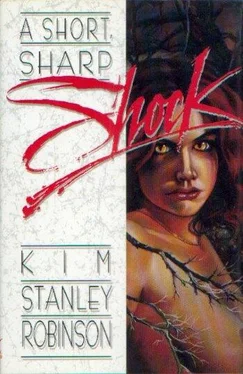“Why have you made these things?” Thel asked. “Why do you do this?”
The sandstone-colored man shrugged. “The peninsula extends around the world, and there is no land but it. And this is the only place in its circumference where the sea had chewed the peninsula down almost to its level. And naturally the peninsula must be passable. Traders come through, and circumnavigators on pilgrimages—believers of more religious persuasions than I’d care to recall. It is simply the natural order of things. The land itself calls forth a guide to sustain that order, and I am the forty-ninth reincarnation of that guide, Birsay.”
He led them to a tall cave entrance in the side of the knob, down stone steps to a dry sand floor. Against one wall were circles of coiled rope, made of some sort of animal hair or plantlike fiber—impossible in this world to be sure which, it occurred to Thel as he examined it. It was thick in the hand, and would certainly hold against any current. The floats Birsay had mentioned were there too, made of the big bulbs one saw at the base of kelp tubes, tied by flat cords to a wooden framework that held them under the arms and around the chest and back. “You spend almost half a day suspended in the tide,” Birsay said. “The water is warm, though by the end it doesn’t feel so. The bath is good for the skin. Then the distance from the rise to the western cape is not as great as the distance from here to the rise.”
The three travelers conferred by eye. Garth said, “When would you have us leave?”
“We’ve wasted too much of this ebb. And they are getting longer every day now, for twenty more days. The next one will begin in the dark before dawn.”
“The next, then,” Thel said, and the other two nodded their agreement.
They spent the night in the cave, around a small warm driftwood fire, the twisted shapes of the wood burning in bright flames tinged with blue, green, salmon. What little smoke there was rose through a blowhole in the roof of the cave. The guide fed them broiled conch; seasoned with wild onions and a gingery seaweed, wonderful after their week of subsistence on Garth’s bitter apples.
Birsay had a place for everything, and he moved neatly and quickly around the fire, catching its light just as the cave walls did, so that sometimes it was hard to see him. He brought out a tray of black loam for Garth to stick his feet into after the regular meal was done, and with a blush and a grateful look, Garth silently buried his feet in the dirt.
“Do you guide all travelers that appear here?” Thel asked.
“I do.”
“You make no distinctions?”
“What do you mean?”
“Those that follow us are murderers, intent on our lives.”
“Is that so?” The wet-pebble eyes regarded them with interest. “Well, I wish you all speed. I make no distinctions of that kind, no. Good, evil, right, wrong—they are personal matters, shifting from one to the next. These murderers may regard themselves as righteous folk, and you as great criminals perhaps, thieves of something they cherish, perhaps, who knows?” Though he glanced at Thel’s mirror bag as if he did know. “How am I to judge? By your stories? By the looks on your faces?” He dismissed the idea with a flip of the hand. “My task is to lead travelers across the low point in the world road. Their purposes, their identity—none of my concern. One winter I led Death himself across the brough, you can still see his footprints in the rock where a wave splashed him and he got angry…” And as the firelight played over his face he told them stories of travelers who had passed, men and women and creatures it sometimes took him the burning of a branch to describe. One such had had the legs and waist of a man, his chest then rising up into the rounded and feathered body of a giant eagle. This creature had spoken to him in grim croaks, and after a while Birsay had guessed the truth; it walked across the brough because it had had its wing muscles clipped, so that it could no longer fly. The guide laughed at Thel: “How judge that, eh? How judge that?”
In the middle of that night Birsay crouched by their warm sand beds and roused them. “The brough comes clear soon.” They rose and ate more conch, and at Birsay’s instruction drank from a jug of fresh water until their stomachs were heavy and cold.
The star flood still lit the beach as they walked onto the wet sand. Birsay watched each wave closely, and as one ran up the sand he pointed. “Last high wave,” he said. “From now on they ebb.”
Then more and more of the beach was revealed as each wave sluiced back and hopped over the nonexistent rail where the water regrouped and turned again. A point emerged, wet tan sand with a crosshatched stippling of black. Then the waves fell back to left and right as they had the afternoon before, and the line of boiling white water appeared. The bar emerged, at first just as an extension of their point of sand, receding away from them at a walking pace: then, in the blue of dawn, the water simply ran away from them to right and left, and they walked on a sandbar that extended all the way to the horizon.
Struck silent at the uncanny sight, the three travelers strode quickly after Birsay, their ropes coiled and hung over their shoulders, their floats hanging on straps tied over their own backpacks and bags. The sun rose and cast long faint shadows ahead of them. The seas rolled up flat wet sand to right and left, the northern and southern seas separated only by their spit of wet sand.
They stepped through patches dense with crunching seashells, or squishy with living anemones. It was a blue day, the air clear as glass and the sea and sky darker and lighter shades of the same full blue. The sand and Birsay were a color composed of tan and black sand, mixed thoroughly. A handful of it washed thin by water revealed clear grains, smaller white and brown grains, and tiny floating black flecks.
Then the sand began to grow thin over bedrock of the same color, which broke through as if it were a little model of the spine, here worn to ankle-high knobs and nubs, split by the sea down its grain of stratification, running across the bar from sea to sea. Eventually they walked on bare rock, sharp ribs of brown that ran out under the white waves, which grumbled toward them to nothing in hundreds of parallel grooves. Little by little the shallow faults turned the brough into a stretch of pitted knife edges, set across their way. Walking over these edges would have devastated first sandals and then feet, but Birsay or his predecessors had rilled a rough narrow path through the faults with blocks of loose stone—an old path, it seemed, for the blocks were worn in their settings, and in places had been washed away.
They hurried over this low causeway, until when they looked behind they could see no sign of Birsay’s knob, or the low peninsula beyond it; ahead they saw no sign of the knob at the halfway point, nor the farther cape. The brough extended all the way to the horizon in both directions, a horizon nearly at eye level, so that it seemed they crossed the bottom of a flatfish bowl of ocean, which would sooner or later rush in on them. It was a strange sight.
In late midafternoon they came to Birsay’s knob, first seen as a bulge in the bar, a widening of the Whitewater to the sides. “We’ve made good time,” Birsay said, “but it’s always a close thing. By sunset we’ll be floating.”
Once on the knob it seemed not much different from the rest of the brough: slightly wider, minutely taller, pocked and runneled like all the rest of the rock they had traversed. In the largest potholes were big,blocks of rock that had had holes chiseled through them, and following Birsay’s instructions they tied the ends of their ropes through these holes. Birsay chose the anchor rocks very carefully, after observing the surging mush and the wind, and his charges’ bodies; he spread them out at intervals along the bar, Thel, Birsay, Garth, the swimmer. Their few possessions they placed in other potholes, with stones placed over them.
Читать дальше












